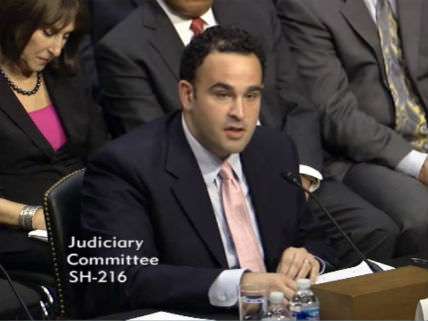'Extremely Misunderstood' Pot Prohibitionist Likens Cannabis Consumers to Drunk Drivers

Last week anti-pot activist Kevin Sabet, in the midst of a seven-city "marijuana education" tour of Oregon, complained that he is "extremely misunderstood." In an interview with The Oregonian, Sabet, a former drug policy adviser in the Obama administration, emphasized that he is not one of those crazy pot prohibitionists who say marijuana is an inevitably addictive "devil's weed" that leads to heroin. Instead he is one of those slippery pot prohibitionists who likens cannabis consumption to drunk driving:
I am not here on a "reefer madness" tour. I am here to talk about the truth, which is most people who try marijuana will not become addicted—just like most drunk drivers won't get into a fatal car crash and most people who don't wear helmets won't get into a bicycle crash.
If Sabet really wanted to put the addictive potential of marijuana into perspective, he would compare the percentage of pot smokers who become heavy users to the percentage of drinkers who become alcoholics. But since the latter percentage is higher, such a comparison would have raised uncomfortable questions about why booze is legal but pot is not. Likewise, if Sabet wanted to talk about the danger of stoned driving in an honest way, he would have compared it to the danger of drunk driving. But since alcohol impairs driving ability more dramatically than marijuana does, that comparison also would have cast doubt on the fairness and rationality of the policy Sabet favors. So instead Sabet compared cannabis consumption to drunk driving, thereby insinuating that all marijuana use, no matter the dose or context, puts other people at risk.
A little more subtly, Sabet worries that "there has been a lot of misinformation about marijuana, mainly because people tend to focus on their own experiences or the experiences of others they know." Who are you going to believe, Kevin Sabet or your lying eyes? Sabet says the truth about marijuana can be found not in the actual experiences of typical consumers but in the opinions of "the American Medical Association or the American Society of Addiction Medicine or the National Alliance on Mental Illness." Yet all these groups specialize in detecting, describing, and dealing with marijuana abuse. Like cops and prosecutors, physicians, psychiatrists, social workers, and addiction treatment specialists do not see a representative sample of cannabis consumers in the course of their work. They see a sample that is strongly skewed toward excessive use and antisocial behavior, which may help explain why Sabet so casually compares pot smoking to driving while intoxicated.
Sabet's tour, which concluded less than two weeks before Oregon voters will start receiving ballots that include Measure 91, a marijuana legalization initiative, originally was supposed to include 13 stops. It was scaled back after critics complained that money from federal anti-drug grants was being improperly used for what looked like part of the No on 91 campaign. Sabet insisted "these are educational events, not political events." The Oregon Health Authority's Addictions and Mental Health Division disagreed, deciding not to participate in the events to avoid running afoul of a state law barring public servants from politicking on the taxpayer's dime.


Show Comments (27)